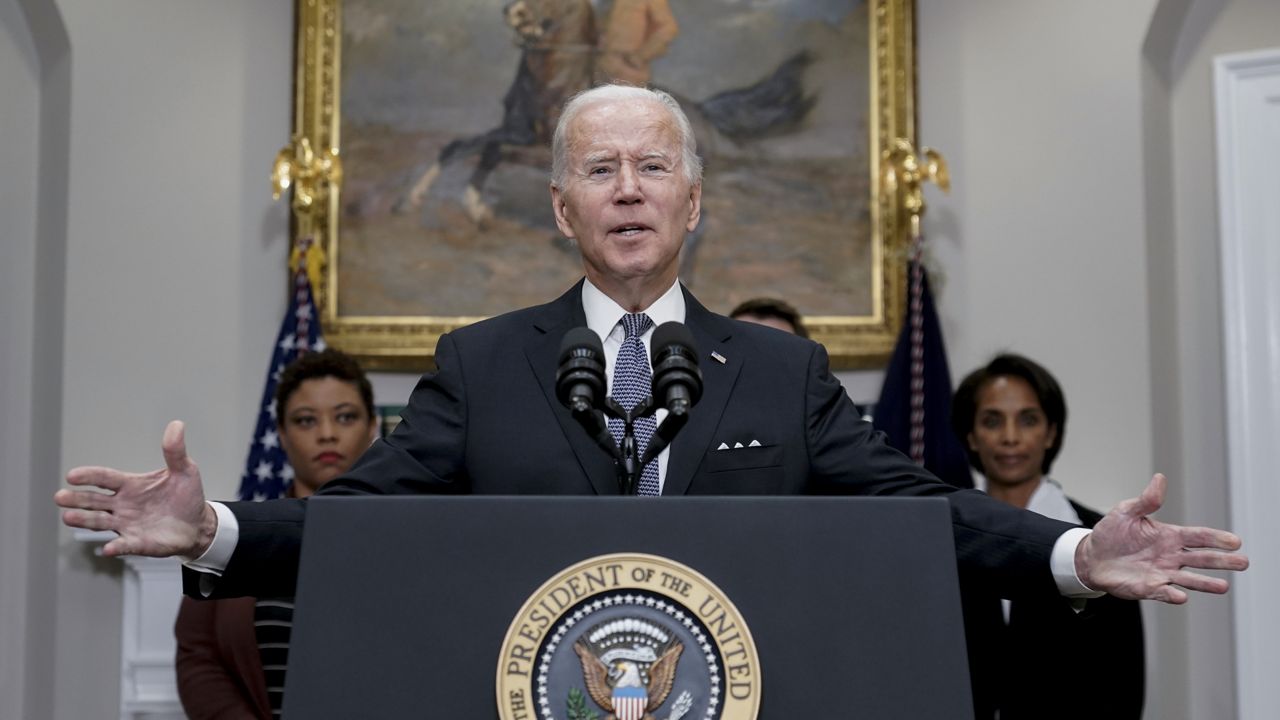President Joe Biden on Friday touted his administration’s progress on reducing the national deficit, a message he attributed to his own policies in the leadup to the midterm elections even as Republicans point to those same provisions as triggering high inflation.
“Today we have further proof that we're rebuilding the economy in a responsible way. Today, my administration announced that this year, the deficit fell by $1.4 trillion, the largest one-year drop in American history,” the president said from the White House. “This record deficit reduction includes the cost of my student loan plan, and everything else we paid for.”
The budget figures released Friday by the Treasury Department reveal dueling visions about what it means to be financially responsible: Biden can rightly claim that the budget deficit for fiscal 2022 plunged $1.4 trillion from the prior year; critics can use the same report to say that forgiving education loans pushed up the federal debt by roughly $400 billion as the government booked the full expense.
The Treasury Department said Friday the federal budget deficit was 562% higher on a monthly basis compared with September 2021, largely reflecting Biden’s plans to forgive student debt as several years’ worth of costs were compressed into one month.
Biden in August announced $10,000 in federal student debt cancellation for those with incomes below $125,000 a year, or households that make less than $250,000 a year. Those who received federal Pell Grants to attend college are eligible for an additional $10,000 in forgiveness.
Republican lawmakers have criticized the debt forgiveness as financially irresponsible, saying it’s a giveaway to borrowers who attended college that comes at the expense of blue-collar workers. States and groups affiliated with Republicans have filed lawsuits to try to block the forgiveness. A federal judge on Thursday dismissed a suit from six GOP-led states, saying the states lacked legal standing, a decision that the states intend to appeal.
Also Thursday, Supreme Court Justice Amy Coney Barrett, who oversees emergency appeals from Wisconsin and neighboring states, rejected an appeal in a separate case brought by a Wisconsin taxpayers group seeking to stop the debt cancellation program.
“Congressional Republicans love to call Democrats big spenders, and they always claim to be for less federal spending,” Biden said Friday. “Let's look at the facts: The federal deficit went up every single year in the Trump administration.”
While it’s true that the national debt skyrocketed under former President Donald Trump, his administration also inherited a deficit projected by some experts to grow on “autopilot” due to Social Security and Medicare costs; the onset of the COVID-19 pandemic and the resulting massive federal packages pushed the already-teetering federal finances further into debt.
By the end of Trump’s presidency, the growth in the annual deficit ranked as the third-largest increase relative to the size of the economy under any U.S. president, according to a ProPublica analysis.
Still, some experts say Biden’s claims about reducing the budget deficit are not as straightforward as they seem. According to one analysis by The Washington Post, Congressional Budget Office estimates before Biden took office predicted the federal deficit would fall $875 billion in 2021; Biden then passed several more COVID-era, infrastructure and other fiscal policies, “resulting in the more modest decline of $360 billion,” per The Post.
Republicans often say that Biden’s own $1.9 trillion coronavirus relief plan helped trigger high inflation, a key concern of voters going into the midterms. They also want to reverse his recent 15% minimum tax on corporations and expanded funding for the IRS, even though both could reduce forecasted deficits.
Biden also used the speech to push back against some of those claims, warning listeners about what might happen should Republicans take control of Congress come this midterm election.
“If you're worried about the economy, you need to know this: Republican leadership in Congress has made it clear. They will crash the economy next year by threatening the full faith and credit of the United States, for the first time in our history putting the United States in default unless we yield to their demand to cut Social Security, Medicare,” Biden said.
Economy, jobs and inflation are reliably polled as the most important issues voters will keep in mind as they head into the midterm elections.
House Republican leader Kevin McCarthy has signaled that he would push for spending cuts if the GOP gains a majority.
“You can’t just continue down the path to keep spending and adding to the debt,” McCarthy said in an interview this week with Punchbowl News. “There comes a point in time where, OK, we’ll provide you more money, but you got to change your current behavior. We’re not just going to keep lifting your credit card limit, right?”



